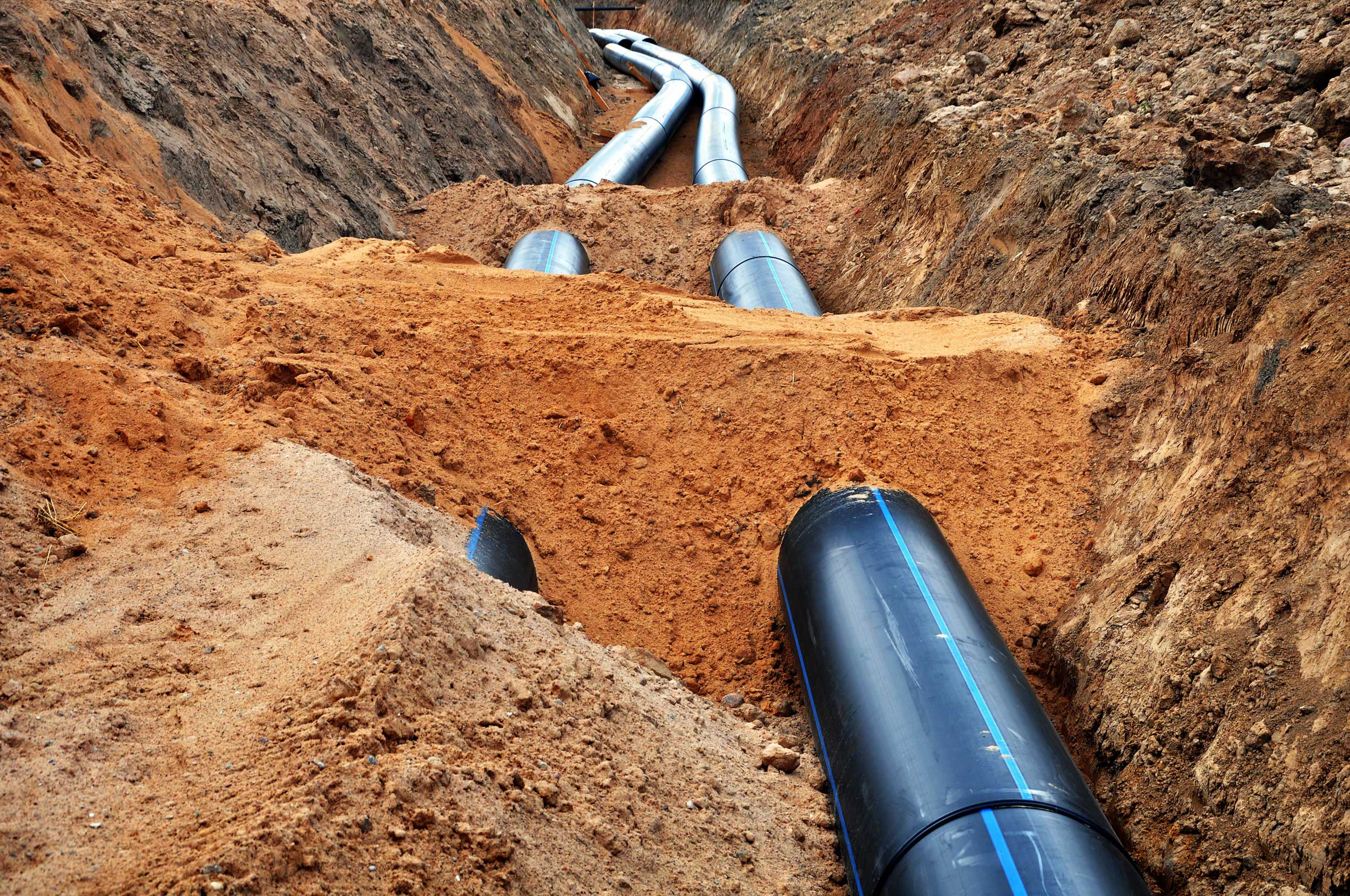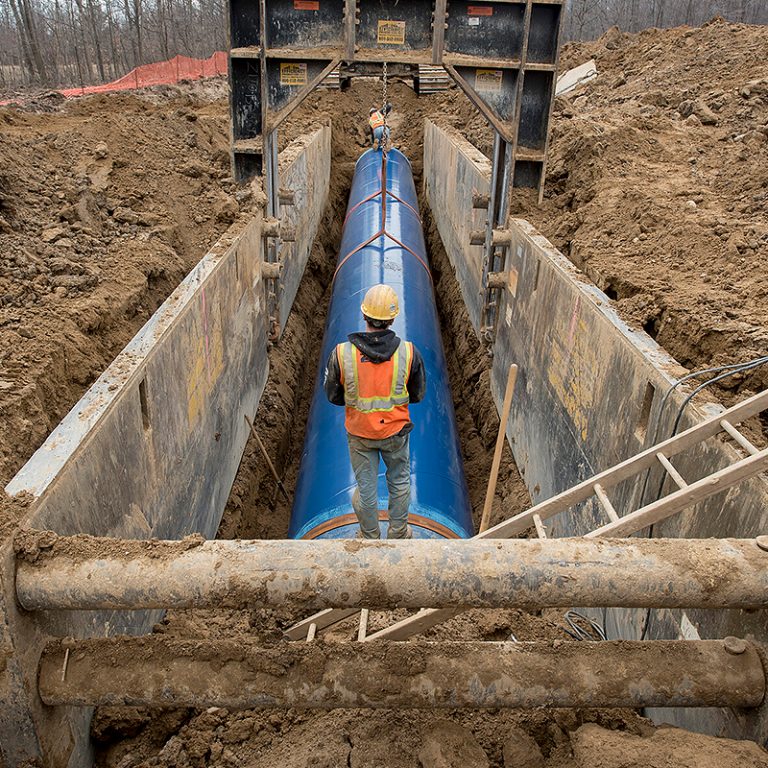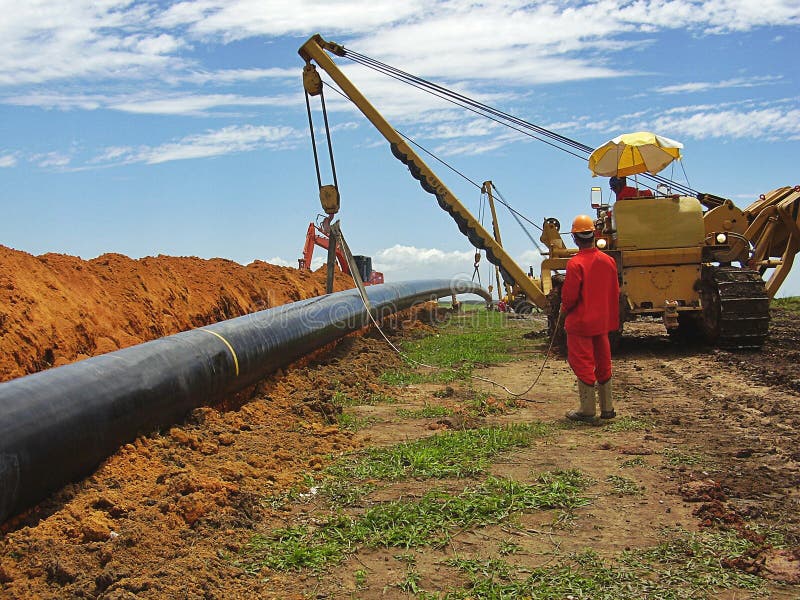Why Pipeline Construction Is Necessary for Energy Framework Growth
Pipeline construction plays an important function in the advancement of power framework, acting as the backbone for the transport of necessary resources like oil and all-natural gas. This complex network not only assists in effective distribution yet likewise boosts economic growth through work creation and regional financial investment. In addition, developments in safety technologies are resolving ecological worries, positioning pipelines as a cornerstone of lasting power approaches. The complexities bordering pipeline projects increase important inquiries concerning governing frameworks and their long-lasting impact on communities and environments. Discovering these measurements exposes a multifaceted story that requires cautious factor to consider.
Function of Pipelines in Energy Supply
The essential role of pipelines in energy supply can not be overemphasized, as they act as the foundation of modern-day energy infrastructure. Pipelines are vital for the efficient transportation of different kinds of power, including oil, gas, and fine-tuned items. They facilitate the activity of these sources from extraction sites to refineries and distribution facilities, making certain that power gets to customers in a timely manner.The construction of pipelines entails thorough planning and adherence to regulatory standards, reflecting the complexities of the energy market and ecological considerations. Efficient pipeline networks are designed to reduce transportation times, reduce prices, and boost safety, while additionally dealing with potential ecological impacts. The ability to move big quantities of energy over fars away makes pipelines a preferred option for power business looking to optimize their supply chains.Moreover, pipelines contribute to energy security by branching out supply paths and sources. As international power needs rise and fall, pipelines allow areas to access different energy materials, mitigating risks connected with dependence on solitary resources. This diversity promotes competitive prices and stabilizes markets, which is vital in a significantly interconnected global economy.In enhancement to their logistical advantages, pipelines sustain local economic situations by developing jobs throughout construction and maintenance phases. The existence of a robust pipeline framework also draws in investments in energy jobs, better boosting local development. Inevitably, pipelines are crucial to the energy field, supplying a trusted and effective means of transportation that underpins economic growth and sustainability.

Benefits of Effective Transport
Efficient transport via pipe systems supplies considerable benefits, consisting of decreased transportation costs and improved delivery speed. These benefits not just enhance the total economics of energy circulation however additionally play a crucial duty in decreasing the ecological effect related to energy transport. As power needs remain to rise, the significance of enhancing transportation methods comes to be increasingly evident.

Decreased Transportation Costs
Lowered transport costs represent a remarkable benefit in the domain of energy infrastructure advancement. The construction of pipelines gives a much more economically feasible methods of moving energy sources contrasted to alternate approaches such as trucking or rail transportation. Pipelines, once established, permit for the continual flow of oil, gas, and various other items over lengthy distances with marginal functional costs.One of the key factors for decreased transportation costs is the effectiveness of pipe systems. They can transfer big volumes of products concurrently, thus spreading out dealt with prices over a better amount of product. This bulk transport capability significantly lowers the price each, making energy sources extra economical for customers and organizations alike.Additionally, pipelines reduce the dangers and costs connected with handling and storing volatile products. Unlike rail or roadway transportation, which can sustain hold-ups and damage, pipelines provide a safer and a lot more constant method of energy transportation. Subsequently, this dependability enhances the economic expediency of energy tasks, enabling better prices structures in open markets. Inevitably, reduced transport expenses foster an even more sustainable energy sector, promoting bigger accessibility and motivating investment in more advancement.
Boosted Delivery Speed
Pipelines considerably boost delivery speed in power transportation, providing an important advantage over standard methods such as trucking or rail systems. The continual circulation of products through pipelines enables a steady and efficient transport process, minimizing delays associated with loading and dumping. This consistent activity is specifically necessary for power resources, where need can vary rapidly.Moreover, pipelines can operate all the time, unaffected by traffic conditions or weather-related disturbances that can hamper roadway or rail transport. This integrity assures that power items reach consumers quickly, supporting operational demands and boosting financial security. On top of that, the scalability of pipeline systems helps with the handling of big quantities of energy, which is important for fulfilling the expanding demands of industries and residential sectors.Furthermore, the integration of advanced tracking and control modern technologies in pipe systems boosts the shipment process. These technologies enable real-time tracking of circulation prices and system stress, assuring that any potential concerns are dealt with quickly. In general, the enhanced shipment speed supplied by pipelines is a significant consider enhancing energy infrastructure and guaranteeing that supply chains remain durable and responsive to market needs.
Environmental Influence Considerations
The benefits of swift power transportation extend past logistical advantages; they also encompass considerable ecological considerations. Efficient pipe systems permit for the transportation of energy sources with minimal disruption to ecosystems contrasted to different approaches such as truck or rail transport. Pipelines can help with the motion of oil, gas, and other materials in an extremely focused fashion, which lowers the carbon impact related to energy distribution.Moreover, pipelines are created with sophisticated safety and security and tracking technologies that significantly reduced the danger of spills and leaks. An effective pipe framework lessens the requirement for regular transportation activities, which can result in minimized greenhouse gas exhausts with time (Professional Oilfield Services Texas). The capacity to deliver energy resources directly to consumers decreases reliance on even more contaminating transportation approaches, additionally benefiting air quality.In enhancement, calculated pipe positioning can aid protect sensitive habitats by adhering to existing hallways, therefore reducing the impact on wildlife and all-natural landscapes. Generally, the construction of pipelines not just supports power infrastructure development but also provides an environmentally accountable methods of delivering energy, adding to a more sustainable future
Economic Effect of Pipeline Projects
The economic influence of pipeline tasks prolongs beyond plain transportation effectiveness, considerably affecting regional and local economic climates. These campaigns produce work possibilities throughout both construction and continuous operations, fostering neighborhood advancement (Pipeline Construction Authority). In addition, the excitement of economic growth via boosted financial investment and facilities enhancement is an essential benefit of pipeline construction
Work Development Opportunities
While energy framework projects typically deal with analysis, they offer significant task production possibilities that can positively influence local economic situations. Pipeline construction tasks require a varied range of experienced labor, consisting of designers, job supervisors, and specialized service technicians, as well as inexperienced laborers for various roles. This complex demand for labor can cause the production of thousands of work throughout the construction phase and typically causes lasting employment possibility once the facilities is operational.In enhancement to guide employment, pipe projects boost local economies by generating supplementary task chances in industries such as transportation, production, and hospitality. Local organizations gain from boosted demand for goods and services, adding to total economic health and wellness. Additionally, the influx of workers can result in raised tax obligation incomes for local governments, which can be reinvested in social work and infrastructure.Moreover, pipeline construction projects often focus on working with regional workers, cultivating a feeling of neighborhood investment and support. By connecting the void between energy supply and need, these jobs not only enhance power safety and security but likewise act as stimulants for financial advancement, enhancing the significance of pipe construction in work creation campaigns.
Economic Growth Stimulus
Pipeline tasks function as a powerful economic growth stimulation, driving significant investments right into local and local economic situations. The construction and procedure of pipelines produce a causal sequence, generating need for materials, tools, and solutions (Midland Pipeline Construction Authority). This influx of capital supports local services, from making to hospitality, promoting a robust economic environment.Moreover, these jobs produce substantial tax earnings for municipalities and states, which can be reinvested in public solutions, framework improvements, and neighborhood development efforts. The economic benefits expand beyond prompt work production, as knowledgeable labor is typically needed for ongoing maintenance and operations, guaranteeing long-lasting employment opportunities.Additionally, the improved power infrastructure promotes the efficient transport of resources, potentially lowering energy expenses for consumers and services alike. By enhancing energy access, pipelines can draw in new industries and promote development in existing fields, contributing to general economic diversification
Environmental Considerations and Developments
Balancing energy needs with environmental honesty becomes progressively crucial as pipeline construction broadens. The search of reliable energy transport should account for ecological influences, necessitating innovative techniques and modern technologies that decrease eco-friendly disturbance. Modern pipe tasks are progressively integrating sophisticated ecological this content assessments at every phase, making certain that possible dangers are identified and reduced early in the planning process.One remarkable innovation in this area is the adoption of trenchless modern technology, which enables the setup of pipelines without comprehensive surface area disruption. This method decreases habitat fragmentation, preserves existing ecological communities, and lessens the carbon footprint connected with standard excavation techniques. Furthermore, real-time surveillance systems furnished with sensors enable drivers to spot leaks or ecological changes quickly, thus promoting prompt actions to potential hazards.Moreover, the consolidation of eco-friendly materials and construction methods is obtaining traction. Naturally degradable boring liquids and corrosion-resistant coatings can significantly reduce the environmental impact of pipe jobs. Firms are also devoting to bring back habitats post-construction, using native plant types to assist in ecological community recovery.Collaboration with environmental companies and neighborhood areas is crucial - Pipeline Construction Authority. Engaging stakeholders in the decision-making process promotes transparency and promotes lasting techniques, making sure that power facilities advancement straightens with ecological stewardship
Difficulties in Pipeline Construction
In the middle of the expanding demand for power infrastructure, various difficulties complicate the construction of pipelines. One of the key concerns is the geographical irregularity of pipe routes, which can go across varied landscapes, consisting of mountains, rivers, and metropolitan areas. Each setup needs customized design solutions to address environmental management, geological security, and logistical constraints.Additionally, the public understanding of pipeline jobs often positions a considerable difficulty. Regional neighborhoods may reveal problems relating to possible environmental impacts, safety threats, and disruption throughout construction. This resistance can lead to delays, increased costs, and the need for substantial community interaction approaches to promote acceptance.Moreover, labor shortages in knowledgeable trades better make complex pipe construction initiatives. As the demand for energy framework expands, the availability of experienced personnel diminishes, which can cause task hold-ups and enhanced labor prices. The pipe sector should purchase labor force advancement initiatives to grow a skilled labor force efficient in meeting the developing demands.Safety remains a paramount worry throughout the construction process. The sector deals with the obstacle of making sure that all security protocols are stuck to, as even minor lapses can lead to significant crashes. This demands extensive training and oversight to maintain functional integrity.Lastly, rising and fall material expenses can affect project budget plans and timelines. The demand for top notch materials, combined with market volatility, calls for careful monetary planning and risk reduction methods to keep projects on the right track. Dealing with these challenges is crucial for the effective and effective construction of pipelines as part of a robust energy facilities.
Governing Framework and Conformity
The regulatory framework controling pipeline construction is intricate and multifaceted, needing conformity with a selection of government, state, and local guidelines. At the government degree, companies such as the Federal Energy Regulatory Payment (FERC) and the Pipeline and Hazardous Materials Safety And Security Management (PHMSA) play critical roles in overseeing pipe tasks. FERC controls the transportation of gas and oil, accepting tasks based upon financial requirement and public rate of interest, while PHMSA concentrates on safety requirements and the view it stability of pipe operations.State guidelines can vary considerably, with individual states enforcing their very own allowing procedures, security guidelines, and environmental analyses. For instance, state utility compensations may call for extra scrutiny of proposed courses to ensure minimal interruption to communities and ecosystems. Conformity with the National Environmental Plan Act (NEPA) is likewise needed, mandating detailed environmental effect assessments before task approval.Local laws may further complicate the conformity landscape, as towns frequently have specific zoning regulations, land usage regulations, and neighborhood interaction demands. Involving with regional stakeholders is not just a regulatory necessity but likewise an ideal technique to assist in smoother project execution.Moreover, the governing landscape is constantly developing, influenced by public view, technological improvements, and ecological plans, demanding continuous caution from pipe operators. Guiding with this detailed regulative structure is vital for verifying that pipeline construction tasks are not only legitimately certified however likewise socially responsible and environmentally lasting, thus adding to the total performance of energy infrastructure development.
Future Fads in Pipeline Infrastructure
A significant transformation is underway in pipeline framework, driven by advancements in modern technology, developing energy demands, and increasing ecological consciousness. As the worldwide power landscape shifts in the direction of sustainable sources, pipeline systems are adapting to fit diverse energy kinds, consisting of all-natural gas and biofuels, while additionally integrating extra advanced tracking and security technologies.One significant pattern is the unification of digital remedies, such as Internet of Things (IoT) tools and fabricated intelligence (AI), which improve real-time tracking and predictive upkeep capabilities. These advancements not just boost operational effectiveness however additionally significantly reduce the risk of leakages and mishaps, making sure greater environmental management. In addition, the use of sophisticated materials, such as composite pipes, is obtaining traction as a result of their resilience and resistance to rust, further prolonging the lifespan of pipeline systems.Moreover, the emphasis on sustainability is prompting the growth of greener construction practices. Techniques such as trenchless innovation decrease land disturbance and environmental influence, aligning pipe projects with contemporary eco-friendly standards. Additionally, governing structures are developing to promote openness and accountability in pipeline procedures, ensuring stakeholders are extra notified regarding prospective dangers and advantages.
Frequently Asked Questions
Just How Do Pipelines Contrast to Other Transport Methods for Power Resources?
Pipelines use an affordable, reliable, and eco-friendly method for delivering energy resources compared to options like trucks and trains, which often incur greater operational expenses, higher land usage, and enhanced greenhouse gas discharges. - Pipeline Construction Authority

What Products Are Generally Used in Pipeline Construction?
Usual materials made use of in pipeline construction include carbon steel, stainless steel, and plastic compounds. These materials are chosen for their stamina, longevity, corrosion resistance, and suitability for different environmental problems and kinds of transported power resources.

Just how Lengthy Does It Commonly Require To Construct a Pipeline?
The period for pipe construction differs considerably based upon aspects such as length, surface, and regulative requirements. Generally, it Professional Oilfield Services Texas can range from numerous months to a couple of years, depending on job intricacy and ecological factors to consider.
Who Are the Trick Stakeholders in Pipeline Projects?
Secret stakeholders in pipe jobs include federal government agencies, regulatory bodies, power companies, ecological organizations, regional communities, and landowners - Midland Pipeline Construction Authority. Each group plays an essential function in preparation, permitting, construction, and continuous operations of pipeline framework
What Are the Main Precaution Throughout Pipeline Construction?
During pipeline construction, main precaution include extensive website analyses, adherence to regulatory standards, thorough training for workers, the usage of individual safety equipment, and continuous surveillance of ecological problems to mitigate dangers and assure functional safety.